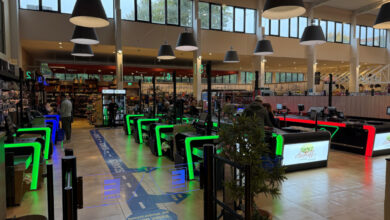Quicker to the shelf and the online shop

Using Bayard’s Byrd technology, the Douglas Group has optimised its master data procurement consistently across its bricks and mortar and e-commerce businesses. The solution enables Europe’s leading omnichannel premium beauty provider to carry out automated quality checks of product content from its suppliers.
Byrd has been fully integrated with SAP Retail and SAP Hybris and supports the creation of customised Excel item sheets. To connect to the Global Data Synchronisation Network (GDSN), the Douglas Group now relies on the b-synced GDSN data pool integrated in Byrd. The omnichannel provider for premium beauty also uses Bayard’s AI solution for automated product classification.
In order to secure and expand its leading market position amidst fierce online competition, the Douglas Group has significantly expanded both its product range and product content across its sales channels. In 2023, the number of SKUs in Germany was already around 193,000. Since 2018 there has been a 40 per cent increase in both the number of products and also the number of product attributes requested from suppliers in order to provide customers with the best possible product information online and in stores.
The end of iteration by phone
With a continuous increase in new listings, the sourcing and quality control of product content was becoming increasingly challenging for the teams before the introduction of Byrd. The completeness and accuracy of the data transmitted via Excel had to be iteratively checked with the suppliers by email or telephone. If the employees involved could not be reached, listings were sometimes significantly delayed. Additional requirements such as checking and documenting safety information and the corresponding data sheets increased the workload for product content management even further.
Goal of the project with Bayard was to use a standardised platform to map data procurement and optimisation for the listing process in the SAP Retail system and content procurement for the e-commerce area. The data quality should be checked automatically as far as possible to ensure that Douglas receives the most complete content available. Suppliers should be able to make corrections themselves directly in Bayard’s b-managed tool. From the outset, the aim was to introduce a system and processes that could be integrated into the different international SAP systems of the Douglas Group’s store and online businesses.
Transparency and data quality
With Bayard’s solution Byrd, the Douglas Group has succeeded in creating a standardised platform for collaborative product content management with business partners. With this technology, they now have different ways of providing data both for the listing process and for additional e-commerce content. Bayard’s solution automatically validates the data sets, prevents the release of incomplete or obviously incorrect product content and allows users to make corrections directly in a user-friendly portal. In the process, Byrd provides transparency on data quality and open tasks at all times.
By introducing Byrd, the Douglas Group was able to speed up the listing process and get items onto the shelves of the Douglas and Parfumdreams stores and online shops more quickly. By March 2024, over 2,100 suppliers in five countries with more than 150,000 products had already been integrated via Byrd.
Complex validation rules
Suppliers now provide product data for listings and e-commerce in a standardised way in one place, either via Excel upload, data entry in the portal or, from 2024, also via the Global Data Synchronisation Network (GDSN). They can also continue using the Excel sheets for the listing, online shop and safety information that was already in place before the introduction of Byrd.
Byrd automatically checks the product content provided for completeness and plausibility using complex validation rules and only releases the data to the Douglas Group once it has been completed and corrected by the supplier in Byrd’s user-friendly b-managed portal. Douglas Group only loads the data into the various SAP applications for the bricks and mortar and e-commerce businesses once it is complete and accurate.
No slow-downs due to holidays
During this product content acquisition process, Byrd ensures the greatest possible transparency of all processes for both the suppliers and the Douglas Group. Processing is no longer tied to specific individuals but can be continued by authorised colleagues if the responsible Master Data Manager is absent. The Douglas Group uses Byrd’s workflow engine to control its product content procurement processes right through to the suppliers, can request the data with different priorities and have it optimised by the manufacturers.
Obstacles mastered
With Bayard, the Douglas Group has successfully managed ...
... to create a consistent solution for product content acquisition from its suppliers across all distribution channels.
... to enable different forms of data delivery to suppliers.
... to automate complex validations so that data quality is assured.
... to support a volatile data model and deviating formats in the international business operations.
... connect the different SAP systems for listing and e-commerce bidirectionally.
... to create a workflow and user administration engine that ensures pending tasks can be processed according to their urgency by all authorised team individuals.
... to largely automate Douglas' own product classification with the help of AI.
... to create a high level of transparency for both sides regarding data quality and product status.
... to optimise the connection of suppliers via the Global Data Synchronisation Network (GDSN).
Another achievement of this project was to establish a bidirectional connection between the SAP systems and Byrd. Thus, for example, item numbers, which are only assigned by the SAP Retail system during listing, as well as stock information and details on relisting are also shared via Byrd from the store retail systems to the e-commerce operations.
Easier for suppliers
“With Byrd, we were able to automate processes and create additional transparency,” explains Eva Hoppe, Project & Process Manager Global Data Quality E-Com at the Douglas Group. “Moreover, the automated validation of the data significantly accelerated the product content procurement process.”
The use of Byrd is also simplifying the work of Douglas Group’s suppliers. Anh Thu Nguyen, Senior Project Manager & Market Data Specialist for the SAP Retail Listing at Douglas, reports that many manufacturers are pleased to receive feedback on their data quality directly in Byrd. The elimination of the labour-intensive and error-prone email exchange of master files for corrections helps to significantly streamline processes on both sides.
GDSN with b-synced
“An important advantage of Byrd is that the data acquisition process is no longer tied to individual people. For example, if a team member is on holiday, a colleague with the appropriate role authorisation can seamlessly continue working on the process,” explains Anh Thu Nguyen. “Before the introduction of Byrd, correction runs were not done with one email – it often took a lot of back and forth until the data was correct.”
Since 2024, the Douglas Group has also been using the b-synced GDSN data pool integrated into Byrd. This means that suppliers can now also submit their data automatically via the Global Data Synchronisation Network (GDSN).
Having successfully implemented Byrd with its suppliers in five countries for SAP Retail listings and in seven countries for e-commerce, the Douglas Group is now aiming for a Europe-wide and Group-wide roll-out.

First-class classification with AI
In order to automate its internal product classification – which deviates from the GS1 standard GPC – for product data received via GDSN, the Douglas Group relies on the b-classified AI solution from Bayard. This was trained during the project using the omnichannel provider's existing premium beauty product data and can now automatically classify new items within Douglas in the vast majority of cases. The solution also recognises how accurate it is in each individual case and passes on any dubious instances to the Douglas Group's Master Data Managers for manual classification.




